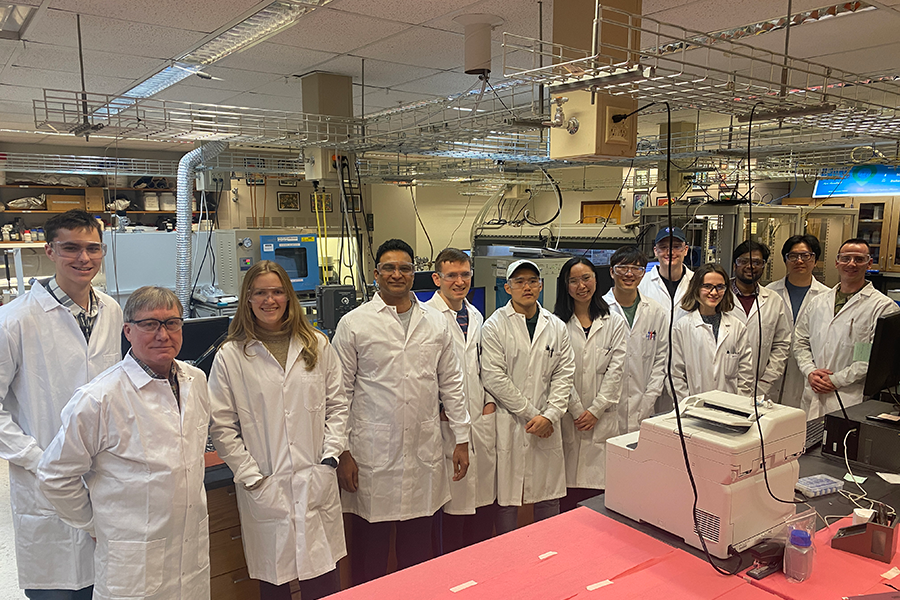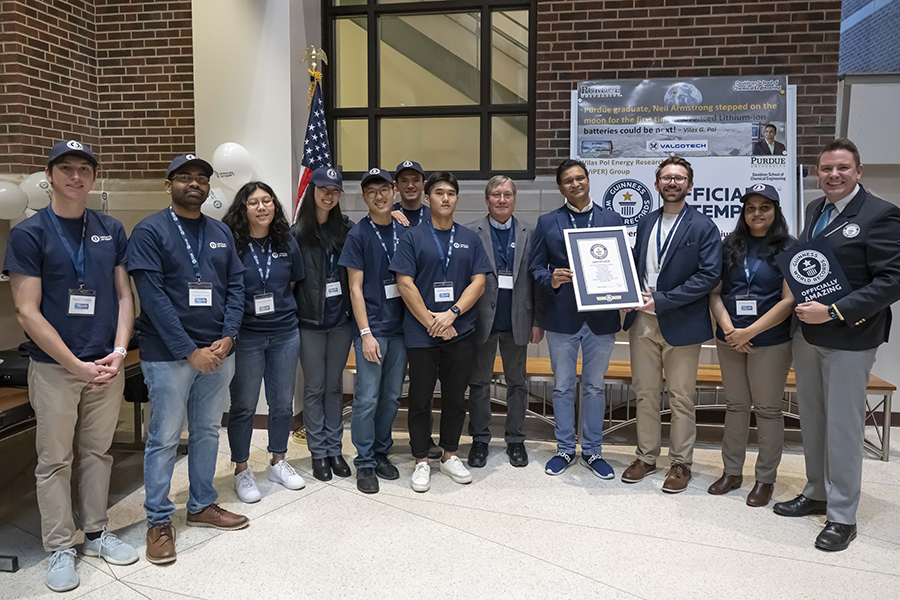The Vilas Pol Energy Research (ViPER) Group Receives DoD Award for Quasi-Solid State Battery Prototyping Equipment
Dr. Vilas Pol, a Purdue University Professor of Chemical Engineering, has recently been awarded a Defense University Research Instrumentation Program (DURIP) grant of $746,198 from the U.S. Department of Defense (DoD). The Vilas Pol Energy Research (ViPER) group intends to use this grant to further support their research and development equipment for fabricating safer quasi-solid-state lithium-ion (Li-ion) battery prototypes.

The ViPER Group’s DURIP grant proposal focuses on developing specialized components inside Li-ion batteries – a type of rechargeable battery commonly used in electronic devices such as mobile phones, laptops and tablets. Using the 2023 DURIP grant, Dr. Pol and the ViPER Group intends to build a prototype facility and equip it with a curated selection of synthesis, fabrication, testing and scaling equipment that will guide the development of safer, fire-proof Li-ion batteries.
To produce free standing, flexible quasi-solid state battery electrolytes films, specialized equipment including homogeneous mixer, hot solid press, different stacking strategy and stack pressure on the cells are required, which is different than roll to roll manufacturing of conventional Li-ion batteries. DURIP funds would allow us to build such state-of-the-art facilities on Purdue University, IN campus.
The ViPER Group’s plan for the DURIP grant supports the DoD’s 2023-2030 Lithium Battery Strategy in securing critical supply chains for domestic manufacturing. According to the Deputy Secretary of Defense, Dr. Kathleen Hicks, Li-ion batteries are the lifeblood of electrification, the future auto industry, and thousands of military systems. As the United States strives to lead the world in Li-ion battery production, the ViPER team continues to provide innovative and disruptive contributions. Using their 2023 DURIP grant, ViPER will develop specialized components and demonstrate their usefulness in the production of safer and high-energy density Li-ion technologies according to the DoD’s strategic objectives.
Purdue’s ViPER Group also collaborates and supports initiatives at the Naval Surface Warfare Centers’ Crane Division (NSWC Crane) and Philadelphia Division (NSWC Philadelphia), and Naval Post-graduate School (NPS), in achieving safer, high-energy density and reliable Li-ion batteries that provide energy storage security through prevention, detection, and control of Li-ion failure and thermal runaway events.
Additionally, Li-ion battery research and development collaborations further the mission Purdue University by providing opportunities educate students including DoD’s active duty and veterans. Currently, the ViPER Group is comprised of numerous undergraduate, graduate researchers, visiting scholars and many military affiliates.
A graduate student Soohwan Kim says “This award is greatly benefitting ViPER team to develop top-notch solid-state batteries, considered a game-changer for higher energy storage with an exceptional level of safety. The advanced facilities from the DURIP grant empower the ViPER Group to continue making innovative and impactful strides in our field.”
The ViPER Group is a two-time DURIP Grant awardee, also receiving an award in 2022 for Li-ion Battery Safety Systems: In situ/Multi-mode Calorimetry, Electrochemical Impedance Spectroscopy, and Critical Temperature Cycling.

The former DURIP grant resulted into ViPER Group’s scientific advancement setting a new GUINNESS WORLD RECORDSTM title for “the lowest temperature, -100 degrees Celsius, to charge a lithium-ion battery.”
ViPER’s Naval Surface Warfare Center, IN collaborator, Dr. Thomas Adams quotes “This timely DURIP grant will provide resources to successfully achieve high-energy dense Li-ion technologies that are solid state, safe and do not exhibit thermal runaway, can operate in extreme temperatures for space and Arctic platforms, and can charge and discharge quickly”.
ViPER collaborator and retired Brigadier General, Dr. Leon Robert says “Thanks to DoD’s funding of DURIP Grants for the School of Chemical Engineering at Purdue University, the next generation of scientists are honing their skills and developing more efficient and safer Li-ion batteries to support our military and the Nation.”
ViPER team lead, Dr. Vilas Pol quotes “We truly appreciate the continuous financial support from various agencies of DoD for more than a decade to materialize dozens of inventions, and discoveries in the battery field for making them safer, longer lasting and functional at extreme temperatures”.
